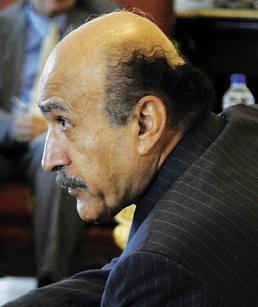Hayward: Egypt is highly relevant to Western culture

Photo: Cherie A. Thurlby/CNN Wire Service
Egyptian Intelligence Director Suleiman addresses concerns during a meeting with Secretary of Defense Robert M. Gates, Secretary of State Condoleeza Rice, Egyptian Foreign Minister Aboul Gheit, Egyptian Minister of Defense Mohammed Tantawi and Egyptian Intelligence Director Soliman in Sharm El Sheikh, Egypt, July 31, 2007. Gates and Rice were in Egypt to discuss regional affairs and the U.S.’s long-term relationship with Egypt.
February 11, 2011
Western culture relies upon Egypt culturally as much as it does politically.
Egypt represents an important alliance in the Middle East, a foothold of Western-tinged ideology and political influence. It secures the region and acts as ancillary support to the United States in its endorsement of the state of Israel. Thus, Western governments contribute extraordinary aid to an administration that, as is now collectively understood, was not fulfilling its democratic duty to serve its people.
Egypt also represents an important cultural point of reference. As children we are taught of mummies and Cleopatra; exorbitant riches and mysterious wonders; sarcophagi; and pyramids. Images of the Sphinx spring to mind; that great creature tested by time, sitting proudly, war-wounded on its desert throne. Each Halloween you will see children wrapped in toilet paper, enacting the ancient tradition of one of the greatest civilizations know to man.
Egypt is the home of paper and hieroglyphics; camel rides and scarab beetles; Indiana Jones and bad Brendan Fraser films. Egypt represents a land of adventure and discovery: a golden fantasy bathed in hot African sun; an escape from Midwestern winters. I would doubt that there is any child who has learned the sanitized and skewed version of Egypt lore that doesn’t want to visit the land of the Nile. Egypt means more to us than we may realize.
But more than those stories shared in classrooms and at bed time, Western culture relies upon Egypt as an important religious anchor. Three of the major religions in the world have significant ties to Egypt. For Jews, Muslims and Christians alike, Egypt is crucial to their religious understanding.
Egypt is the land of Passover and the plagues. Egypt is the home of Moses. Saved by his mother, baby Moses was found floating in a basket down the sapphire ribbon that is the Nile, and grew to torment the Pharaoh with predictions of locusts and floods among other atrocities. A savior to the Israelites, he read the Ten Commandments and parted the sea. He led his people to freedom, and as they say, the rest is history.
As Egypt is not in and of itself the “holy land,” it is acknowledged by all three monotheistic religions to be equally significant. Egypt is now the home for a large number of our Muslim brothers and sisters. Along with Islam’s rich and ancient history in the region, Egypt is without doubt a significant scene in its modern history.
Yet, Egypt has regretfully become a land of subjugation, and again we see the oppressed rising against their leaders. We are not in a time of a prophetic pioneer leading his followers into a desert of sparsely inhabited land to which they can escape, we are in a time of diplomatic coercion and trade barriers, of international pressure and Wikileaks, where access to the Internet is like a sea divided.
We are in a time when Egypt and its people are calling on her many allies, and so we respond to her calls.
President Barack Obama has called for the Egyptian government to enact real change, as opposed to shuffling power. On the other side of the globe, Australia’s foreign minister and former prime minister, Kevin Rudd, has called for the Egyptian military to show restraint and allow Egyptians “the right to peaceful protest.” While the U.K.’s prime minister, David Cameron, has called for “irreversible, urgent and real” political reform in Egypt. Western solidarity with Egypt is indisputable, it spans oceans and political agendas and it is a display of the actual and measurable success of unified democratic ideology.
We cannot, and must not, deny that Egypt plays a vital role in the western tapestry. We must embrace the plight of the Egyptian people if not for the sake of the innocent souls neglected by a wildly irresponsible government, but for the sake of our own stories, our own histories.
Western history has, in part, sprung like papyrus from that fertile delta. It is a sign of acknowledgement of our combined histories and futures that Western leaders stand by the people of Egypt to ensure that a land so mythologized by our culture prospers as a very real home to millions of Egyptians.
















